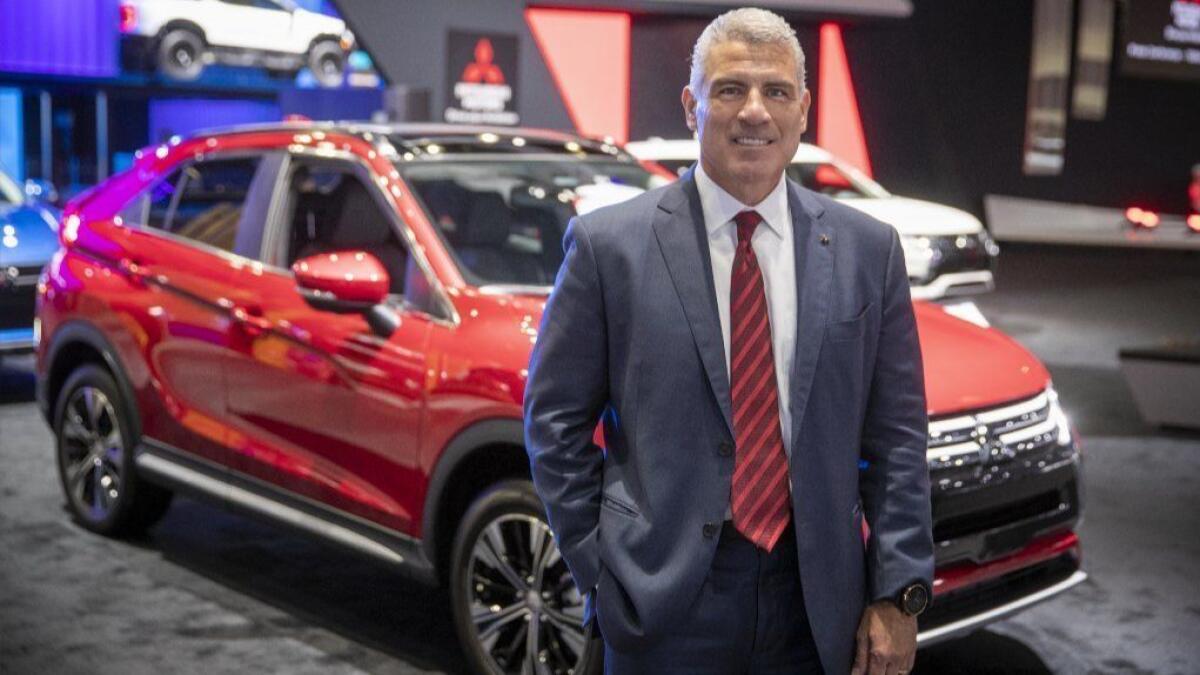L.A. Auto Show: Weighing Trump’s stance on GM, tariffs and trade

- Share via
President Trump was the 6-ton monster truck bursting into the roomful of gleaming new vehicles on display at the L.A. Auto Show this week.
In recent days Trump publicly criticized General Motors Co.’s plan to close several plants and cut nearly 15,000 jobs, threatened to cut electric-vehicle subsidies that benefit GM, and stepped up his threat to impose higher tariffs on imported cars to help preserve U.S. production of those vehicles.
For auto executives such as Fred Diaz, an industry veteran who earlier this year became president of Mitsubishi Motors’ North American operation, it’s the latest example of the nation’s chief executive directly and publicly trying to influence the direction of private business.
“Certainly it’s a new variable, a new twist,” Diaz said of Trump’s actions. But Diaz did not express alarm, saying “it’s a part of daily business life. Just when you thought you’d seen everything, something new comes up the following week.
“He’s the president and he can and will do or go wherever he wants to go,” Diaz said during an interview at Mitsubishi’s booth at the Los Angeles Convention Center, where the auto show opens to the public Friday.
And if one outcome is higher tariffs on U.S. imports of Mitsubishi vehicles, which are all built overseas? “We’re looking at it and watching it carefully,” Diaz said. “If it happens, it’s out of our control and we’re going to have to adjust our business and our strategies for how we operate in North America.”
John Bozzella, president of the Assn. of Global Automakers, a trade group for Japanese carmakers and other foreign car companies, acknowledged that Trump’s direct involvement was unusual. But Bozzella said it would not alter his group’s opposition to higher tariffs, even if imports from Canada and Mexico are excluded due to separate trade agreements.
“If we’re going to manage in this environment,” Bozzella said in reference to Trump, “we‘ve got to stay focused on what the right policy is.”
American consumers should be concerned about the impact of punitive tariffs on auto parts and autos, he said. The United States currently charges a 2.5% tariff on imported cars and SUVs, and Trump has indicated a desire to lift the charge to 25% if necessary, which is the tariff now applied to U.S. imports of pickup trucks.
The Trump administration earlier this year imposed 25% tariffs on steel imports and 10% duties on imported aluminum.
The United States and China also have been locked in an escalating tariff fight. Trump in September slapped 10% tariffs on an additional $200 billion of Chinese goods after China placed tariffs on an additional $60 billion of U.S. products. The U.S. duties would rise to 25% next year if the U.S.-China trade dispute isn’t resolved.
“Every car sold in this market — even cars made in America — has some level of parts made outside the United States,” Bozzella said. “The price of a U.S.-made car will go up as a result of these tariffs. We’re talking about thousands of dollars of increased costs.”
Diaz already has enough challenges at Mitsubishi’s North American headquarters in Cypress, Calif. After peaking in the early 2000s, when Mitsubishi sold more than 350,000 vehicles a year, the company went into decline. But it’s been rebounding in recent years, and its sales are set to increase for the sixth consecutive year in 2018 by topping last year’s 103,686 vehicles.
With a product line led by its Eclipse and Outlander crossover SUVs, Mitsubishi is competing in a popular market. But Diaz acknowledged that Mitsubishi remains a small player that needs to better market its vehicles.
“The momentum is there and the growth is there,” Diaz said. “Awareness is our biggest issue, for people to know we’re still here,” especially in California. “We need to be doing a lot better in California than we’re doing right now.”
Twitter: @PeltzLATimes
More to Read
Inside the business of entertainment
The Wide Shot brings you news, analysis and insights on everything from streaming wars to production — and what it all means for the future.
You may occasionally receive promotional content from the Los Angeles Times.










